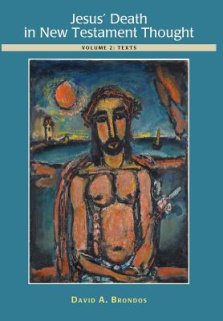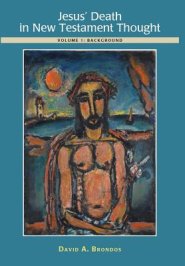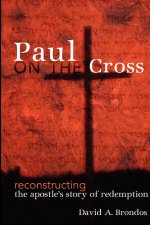Jesus’ Death in New Testament Thought is unlike anything written on the subject to date. It represents a radical break with the traditional models or “theories” of atonement based on ideas such as penal substitution, participation in Christ, and the Christus Victor motif, claiming that all of these ideas as commonly understood are foreign to New Testament thought. On the basis of his analysis of second-temple Jewish thought, Brondos demonstrates that, for Jews in antiquity, what atoned for sins and led people to be declared righteous in God’s sight was not sacrifice, suffering, or death in themselves, but the renewed commitment to living in accordance with God’s will which they manifested by means of their sacrificial offerings and at times their willingness to endure suffering and death out of faithfulness to that will.
According to the thought of Jesus’ first followers, in accordance with a divine plan conceived of before the ages, in Jesus God had sent his Son in order to establish around him a community of people fully committed to practicing the love, justice, solidarity, and righteousness associated with God’s will for all. Jesus’ dedication to this task led to confrontation and conflict with the powers and authorities of his day, who sought to silence him by having him put to death. Because he stood firm and remained faithful to that task rather than backing down from it, he was crucified on a Roman cross.
Paradoxically, however, in this way he laid the basis for the existence of the community God had desired from the start, stamping it forever as one to which no one could truly belong without assuming the same firm commitment to Jesus and everything for which he had lived and died. Those who form part of this community, living out of faith under Jesus as their risen Lord, come to practice God’s will as redefined through Jesus and on that basis are forgiven and accepted as righteous by God.
Thus, by giving up his life out of love for others in faithfulness to the task his Father had given him, Jesus has attained the redemption, reconciliation, cleansing, and justification of those who now live under his lordship as members of the worldwide community of believers from all nations that God has established through him and his death, in fulfillment of the promises that God had made of old to his people Israel.
In Volume 1, Brondos looks to the relevant texts from antiquity to trace the background and development of these ideas. His argument will leave the reader with no doubt that Jesus’ first followers understood the salvific significance of his death or blood in the manner just outlined, and therefore that the traditional interpretations of his death that have prevailed from patristic times to the present do not reflect faithfully their thought as we find it in the New Testament.
In Volume 2, Brondos examines the formulaic allusions to Jesus’ death that we find scattered throughout the New Testament and other early Christian writings so as to demonstrate that these are precisely the ideas that lie behind those allusions. At the same time, through his analysis of the writings of Melito of Sardis and Irenaeus of Lyons, he provides clear evidence that, by the late second century, ideas that are foreign to those texts began to be read back into them, with the result that the original understandings of Jesus’ death that had developed among his first followers came to be replaced by other understandings that run contrary to their thought.
In his Conclusion, Brondos argues that only by rejecting the traditional models of atonement and returning to the New Testament teaching on this central doctrine can the Christian church respond effectively to the crisis it faces today and bring about the restoration of the type of communities envisioned by Jesus and his first followers.
Trustpilot







![The Untold Story of the New Testament Church [Revised and Expanded]](https://www.eden.co.uk/images/150/ef6e5dac9021-9780768461626.jpg)